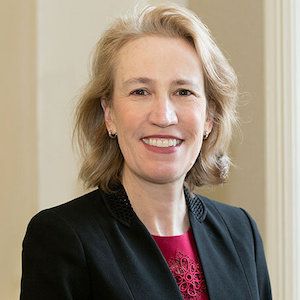Phase 3 Trial Data on Bimekizumab for Patients with Hidradenitis Suppurativa
New late-breaking data showed positive results for bimekizumab treatment of hidradenitis suppurativa, with higher response rates and a strong safety profile.
Alexa B. Kimball, MD
Credit: bidmc.org

Bimekizumab treatment for hidradenitis suppurativa (HS) patients was successful in achieving its primary endpoint, being well-tolerated, and not showing any unexpected safety findings, according to new data.1
This late-breaking trial data was presented at the American Academy of Dermatology (AAD) 2023 Annual Meeting in New Orleans, LA. It resulted from the BE HEARD I and II trials and was presented by trial investigator Alexa B. Kimball, MD.
Kimball is a professor of dermatology at Harvard Medical School and board member at the Beth Israel Deaconess Medical Center.
HS tissue has elevated levels of IL-17F and IL-17A, which Kimball and colleagues noted indicates a role in the immunopathogenesis of the skin condition. The drug—a monoclonal IgG1 antibody—selectively inhibits IL-17F and IL-17A.
The studies, BE HEARD I and II, were set up as randomized, placebo-controlled, double-blind, phase 3 trials. They were initially 16-weeks and then had a 32-week maintenance treatment period.
The investigators randomized 1,014 patients with moderate-to-severe HS to (initial/maintenance) bimekizumab 320 mg for every 2 weeks versus placebo. They wrote that their primary endpoint was a 50% HS Clinical Response (HiSCR50) at 16 weeks, and that their secondary endpoint was HiSCR75.
Overall, the investigators found that a greater percentage of HS patients achieved HiSCR50 in the group treated with bimekizumab compared to placebo at 16 weeks. For those in BE HEARD II, the rates were 45.3 % versus 28.7%, and in BE HEARD II, rates were 53.8 percent versus 32.2%, respectively.
They also noted that a bigger proportion of study participants in the treatment group achieved HiSCR75 at week 16 compared to placebo. There was statistical significance in BE HEARD II during both dosing regimens and BE HEARD I after 2 weeks.
The investigators added that maintenance of responses up to week 48 with the bimekizumab group for both HiSCR50 and HiSCR75 across all regimens of dosing and across both trials.
Lastly, they also noted that bimekizumab’s safety profile across both studies was found to be consistent with prior studies, adding that there were no newly-observed safety signals.
Currently, the US Food and Drug Administration has only approved 1 treatment for HS which is the biologic known as adalimumab.
References
- Kimball A, et al. Bimekizumab in patients with moderate-to-severe hidradenitis suppurativa: 48-week efficacy and safety from BE HEARD I & II, two phase 3, randomized, double-blind, placebo controlled, multicenter studies. Paper presented at: American Academy of Dermatology 2023 Annual Meeting; March 17 – 21. New Orleans, LA. Accessed March 20, 2023.